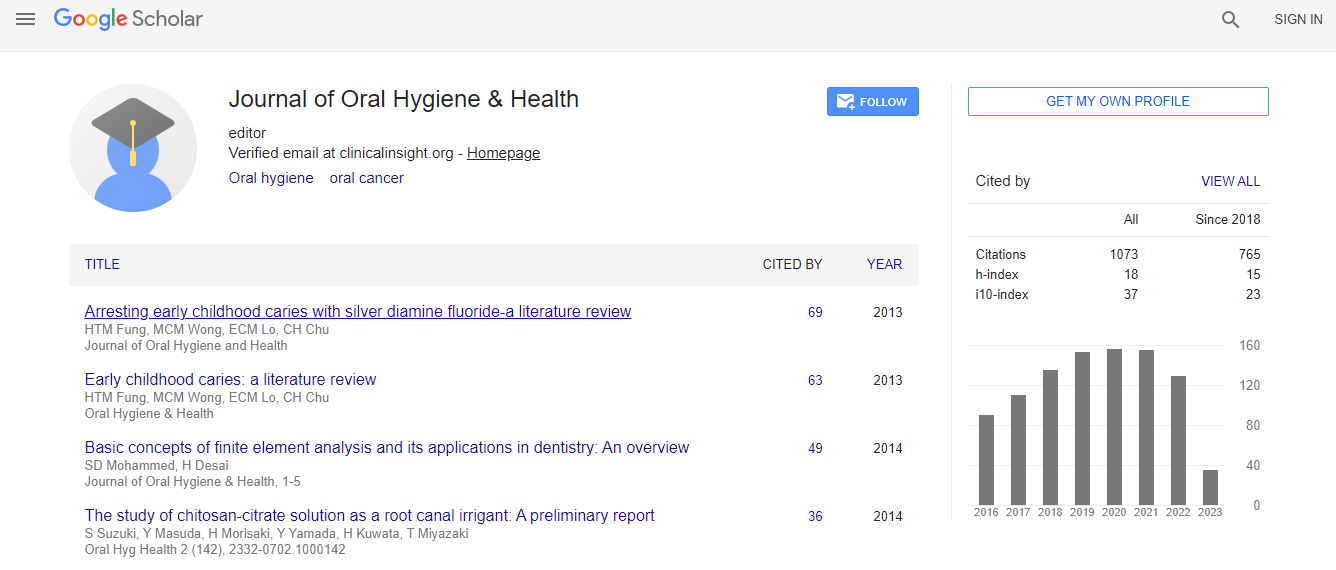Our Group organises 3000+ Global Conferenceseries Events every year across USA, Europe & Asia with support from 1000 more scientific Societies and Publishes 700+ Open Access Journals which contains over 50000 eminent personalities, reputed scientists as editorial board members.
Open Access Journals gaining more Readers and Citations
700 Journals and 15,000,000 Readers Each Journal is getting 25,000+ Readers
Google Scholar citation report
Citations : 1073
Journal of Oral Hygiene & Health received 1073 citations as per Google Scholar report
Journal of Oral Hygiene & Health peer review process verified at publons
Indexed In
- Index Copernicus
- Google Scholar
- Open J Gate
- JournalTOCs
- RefSeek
- Hamdard University
- EBSCO A-Z
- OCLC- WorldCat
- Publons
- Geneva Foundation for Medical Education and Research
- Euro Pub
- ICMJE
Useful Links
Recommended Journals
Related Subjects
Share This Page
TLR4 gene polymorphism and inflammatory response in chronic periodontitis
International Conference on Oral Health and Dental Medicine
Alina Smalinskiene
Lithuanian University of Health Sciences, Lithuania
ScientificTracks Abstracts: J Oral Hyg Health
Abstract
Statement of the Problem: periodontal disease is one of the most common chronic diseases in humans and is induced by microbial pathogens that reside in the oral cavity. The Toll-like receptor (TLR) family of innate immune recognition receptors plays a fundamental role in the induction of innate immunity, inflammation, cell survival, and proliferation. The presence of TLR4 has been shown to be essential for the progression of inflammation and related to the bone metabolism in periodontitis Pelargonium sidoides DC. root extract (PSRE) demonstrated possibility to exert stimulatory effects on the innate immune system. Purpose of this study: determine the prevalence of polymorphism of TLR4 rs1927911 gene in patients with periodontitis in association with clinical signs of periodontitis and assess the protective effect of Pelargonium sidoides DC root extract (PSRE). Methods: data from 40 patients with periodontitis, treated with PSRE and 20 subjects of the control group were studied. DNA extraction from patients’ peripheral blood leukocytes using commercial DNA extraction kits was performed. Genotyping using a real-time polymerase chain reaction method was done. Statistical data analysis using IBM SPSS Statistics program was done. Results: the frequency of TLR4 rs1927911 (C/T) genotypes and alleles in patients with periodontitis and control group subjects was evaluated. Patients with periodontitis: 9.1% have TT, 39.4% - TC , 51.5% - CC genotype and 28.8% have T allele and 71.2% C allele; respectively in control group: 6.3%, 36.5% , 57.1%, 24.6% and 75.4%. No statistically significant differences, of all the studied genotype and allele frequencies, between periodontitis and control group were found. The impact of polymorphism of the TLR4 rs1927911 gene, correlation between polymorphism and susceptibility to periodontitis were evaluated and no statistically significant differences were found. Conclusions: There was no statistically significant difference between TLR4, genotypic and allelic frequencies in patients with periodontitis and those in the control group. Continuing of TLR4 gene polymorphism studies by increasing the number of patients with periodontitis would be advisable. It could reveal the significance of genetic and environmental factors for the onset of the disease more. Polymorphisms of TLR 4 gene could be used as molecular markers for the prediction of the disease.Biography
Alina Smalinskiene is Scientific Researcher at the laboratory of Molecular Cardiology of Institute of Cardiology, Lithuania Lithuanian University of Health Sciences and Associate professor in the Lithuania Lithuanian University of Health Sciences. A.Smalinskiene received her undergraduate training in Biology at Vilnius University at Nature Faculty and the Ph. D. degree in Biology from Kaunas University of Medicine. A. Smalinskiene has accumulated research experience of genetic epidemiological lipid metabolism disorders. A. Smalinskiene was a supervisor of project funded by the State studies and science foundation and economic entity. 2010-2 014 she worked on three Research Council of Lithuania projects. She is an author and co-author of 31 scientific articles. A. Smalinskiene also participated in 60 conferences, where she presented the results of her work. She participates in the teaching of genetics and cell biology to graduate students.
E-mail: alina.smalinskiene@lsmuni.lt

 Spanish
Spanish  Chinese
Chinese  Russian
Russian  German
German  French
French  Japanese
Japanese  Portuguese
Portuguese  Hindi
Hindi 
